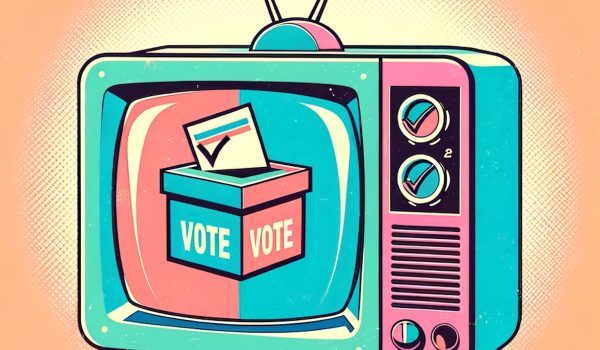Ad Tech's Role in the 2024 Electoral Arena
by on 29th Jan 2024 in News

As the 2024 elections draw nearer, ad tech is actively reshaping campaign strategies, altering voter engagement, and redefining the dynamics of the electoral process. What does this mean for the future of political discourse and the democratic process?
In the landscape of modern politics, where the pulse of public opinion and the strategies of election campaigns are increasingly intertwined, ad tech has emerged as a quiet yet powerful driving force. As we approach the 2024 U.S. elections, ad tech stands at the forefront, not merely as a tool but as a transformative element in the art of political engagement. Projections indicate a record-smashing $10bn (~£7.86) will be spent on political ads in the run up to the 2024 electoral battle, as political coffers swell with contributions from a range of donors.
We explore the convergence of bytes and beliefs, examining how ad tech is reshaping the democratic discourse as we know it, for better or worse.
Ad Tech in the Political Arena
Ad tech has become a sophisticated, data-driven pillar of political strategising.
In this crowded field, where both political entities and various interest groups vie for audience attention and action, possessing cutting-edge strategies, insights, and tactics becomes crucial for the success of any campaign.
In the realm of politics three cutting-edge ad tech strategies stand out for their transformative impact. First, programmatic ad buying offers real-time reactions to unfolding events, enabling campaigns to instantly broadcast responses across various platforms. This agility ensures that a campaign's message aligns seamlessly with the rapidly evolving news cycle. Second, microtargeting, leverages data analytics to segment voters, tailoring messages to specific groups and individuals, thus enhancing voter turnout and persuasion. This technique optimises resources and ensures targeted efficiency. Finally, geofencing technology marks a strategic innovation, targeting individuals within specific geographic boundaries, like political rallies, to deliver highly relevant and contextual mobile ads.
CTV Could Pick the Next President
Traditional TV, as it stands, still has the lion’s share of ad spend, but those who master CTV and programmatic stand to win big in this evolving landscape.
Contrary to the narratives that call attention to the decline of TV, the presidential elections administer a rather potent dose of 'long live TV' to broadcasters far and wide - only with a twist. Increased investments into the CTV space signify that the tried-and-true playbook of TV political campaigning is receiving a bit of an ad tech makeover. In fact, If political advertisers continue to follow consumer trends, 2024 digital budgets could see their ad spend meet or even exceed traditional or linear budgets. For the 2023-24 political season, AdImpact predicts a 33% rise in ad spending on CTV compared to the 2022 midterm elections, while Vivvix CMAG's projections estimate that spending on CTV will reach $1.8bn (~£1.41bn), an increase from $1bn (~£790mn) in 2022.
While political agents have taken notice of this meteoric rise in demand, marketers' CTV budgets swell in response. Data rich CTV offers digital targeting capabilities enabling access to audiences who have augmented or completely substituted their linear viewing time with digital media. The appeal of CTV is directly contingent on a campaign's aim to simultaneously inform voters and forge an emotional bond that motivates them to vote. Video, in its unique capacity, effectively serves both purposes. CTV presents an evolution of this paradigm, offering the traditional experience and advantages of television while integrating the precision of digital targeting. This technology reaches viewers who have supplemented or entirely shifted their viewing from linear to digital formats.
CTV and programmatic advertising stand out for their ability to quickly update and disseminate campaign messages, enabling tailored, impactful communication. This approach is enhanced by integrating rich first-party campaign data with diverse third-party datasets, allowing for hyper-targeted messaging across voter demographics.
In the Market for Misinformation
Any discussion about the role of ad tech within the political domain cannot be had without delving into the ethical pitfalls. Ad tech, while a powerful tool for increasing voter engagement, walks a tightrope over a chasm of moral concerns.
Concerns surrounding misinformation were brought to the forefront just a few months ago, with news that X and Meta now allow political advertising back on their respective platforms. This development has significant implications for ad tech, highlighting the growing complexity of monitoring and regulating digital advertisements. With the re-introduction of political ads, ad tech companies face the challenge of deploying advanced algorithms and human oversight to differentiate between legitimate political messaging and potentially misleading content. In the recent case of Elon Musk’s X, EU regulators have asked Musk to hire more people, as opposed to AI, to fact-check and review illegal content and disinformation.The effectiveness of these technologies in maintaining the integrity of political discourse on these platforms will be a critical factor in the upcoming election cycle, as the industry grapples with its role in shaping public opinion.
The fight against misinformation is particularly prevalent for AI and its role in political advertising. AI can be used as a force for good. AI tools like OpenAI's ChatGPT, Microsoft's Bing, and Google’s Bard offer the capability to create tailored, sophisticated marketing messages that resonate with specific voter groups. These tools can adapt these messages for various subgroups, doing so on a massive scale. This capability is particularly beneficial for addressing the diverse concerns of different voter demographics, such as women, young voters, parents, and rural communities.
On the other side however, the use of AI in political campaigns raises significant concerns regarding the proliferation of false or misleading content, as exemplified by incidents like Florida Governor Ron DeSantis's campaign sharing AI-generated deepfakes. The absence of regulatory frameworks for AI in political advertising also intensifies the risk of misuse by bad actors, spreading misinformation online. For example, AI tools like ChatGPT can generate false content, leading to factual inaccuracies in campaigns. This issue is compounded by AI's tendency to produce content that may not consistently align with a campaign's core messaging, potentially leading to confusion and disillusionment among voters. Additionally, AI systems, trained on biased internet data, may reflect these biases in the political content they generate, creating a challenge for campaigns to maintain neutrality and factual accuracy in their AI-driven advertisements. Reassuringly, OpenAI has hatched a master plan to combat election misinformation, which includes banning users from using OpenAI’s tools to impersonate candidates or local government. Users are also not permitted to use OpenAI tools to discourage voting or misrepresent the voting process.
With so much movement, the scene is being set for a potentially messy electoral battleground, where the crossover of ad tech and political advertising is poised to test the resilience of digital platforms against misinformation.
Staying Ahead During the 2024 Election Cycle
In the context of the 2024 elections, advertisers face the need for agility and periodic strategy adjustments. This is crucial not only to avoid the heightened competition for ad space but also to preserve a fair and free electoral process. With a calendar densely packed with political developments, these adjustments may include re-timing campaigns or shifting ad buys to less saturated platforms. Such strategic adaptations are imperative for advertisers to effectively operate in an increasingly crowded market while safeguarding their brand's image.
The role of ad tech in the 2024 elections will be scrutinised not just for its technological prowess, but for its ethical stance in helping to shape a fair and transparent electoral process.
Ad TechAIBig TechCookiesCTVDisplayMobileTechnology








Follow ExchangeWire